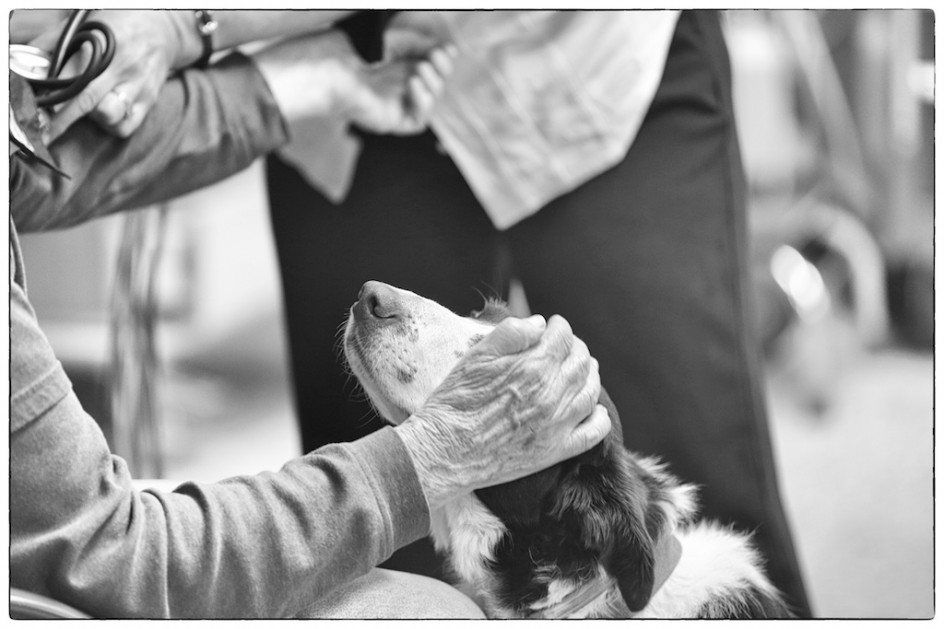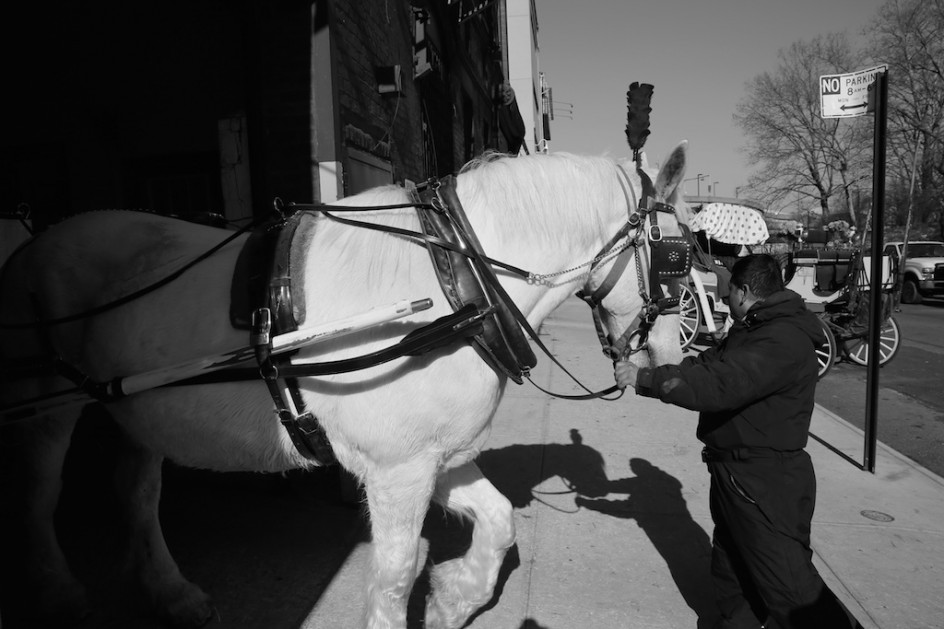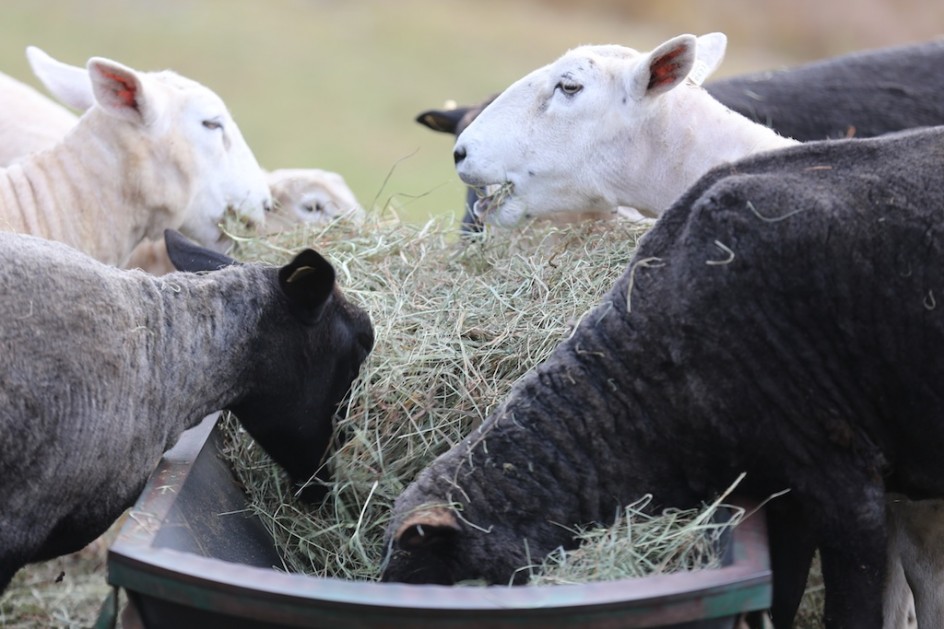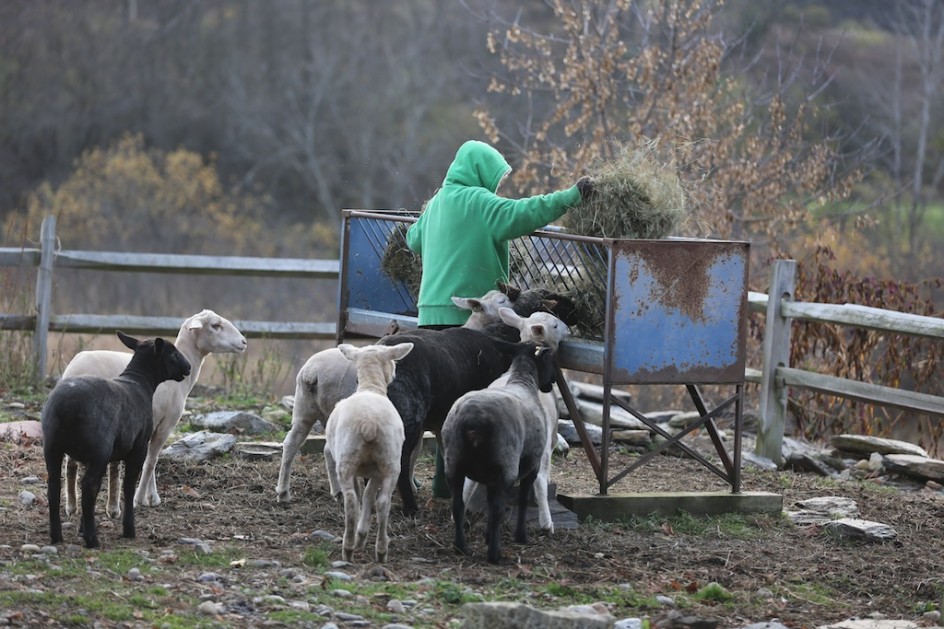
Day: November 1, 2014
Dinner For Sheep
The New York Carriage Horses And Ebola: Big Lessons From A Nurse In Maine

There are many lessons and implications for the New York Carriage Horses, the carriage trade, the mayor and the animal rights groups of New York City in the ruling handed down Thursday by by Judge Charles C. LaVerdiere, the chief judge for the Maine District court, in the dramatic conflict over Nurse Kaci Hickox and the efforts of three different and powerful governors to force her into involuntary quarantine.
At issue, really, was whether government would surrender to the largely misinformed panic over Ebola and sacrifice individual rights and her dignity and freedom for the mob’s notion of the public good. Politics is fascinating, if unpleasant, and quite a few of the people who like my writing on the carriage horses are not as happy with my writing about Kaci Hickox. I seem to have drifted to the other side on this issue.
As a writer, that has to make one feel good.
I got a copy of the ruling today, and I read it carefully. I believe many of the issues raised by Hickox and addressed by Judge La Verdiere are similar to those facing the carriage trade, especially those relating to the reach of government, the basis for limiting the freedom of people who have done no wrong and pose no danger, and the civil rights of citizens. The judge’s ruling ought to give comfort and guidance to the carriage trade in New York City, it bodes poorly for the campaign of animal rights groups to banish the horses from New York.
The Ebola case raises some issues that are very different from those in the carriage horse controversy, but many are almost eerily similar. The judge set reasonable limitations and restrictions on Kaci Hickox’s movements, but rejected the panic and hysteria that doctors say are shaping the response of politicians to the Ebola epidemic in West Africa.
The judge ruled that the power of government to take extreme actions against citizens – to quarantine them, (or in the case of the carriage trade, shut down their industry, take away their ability to earn a living and pay their bills, and seize their private property – the horses) – is subject to limits. The state must show, he said, that it made an “individualized assessment that a person poses a risk,” as well as demonstrate to the court that the decision was based on sound evaluation and fact, in this case a scientific evaluation by doctors and health care specialists, not politicians or angry people on Facebook.
When depriving a person of liberty, the judge said, the government must also use the least restrictive alternative to achieve public safety.
This ruling on government power and the deprivation of liberty speaks directly to the carriage trade debate in New York, especially when Mayor Bill deBlasio has repeatedly denounced the government overreach in the Hickox case, and defended Hickox’s notion of civil rights: that is, she has no right to be persecuted by the government if she is healthy, poses no danger to anyone, and has committed no crimes.
The government in New York City is also engaged in what appears to be overreach, seeking to shut down the carriage trade, take away the work and sustenance of hundreds of people, send hundreds of horses out of safety and into peril, and pressure the drivers to surrender the work they love and drive vintage electric cars in Central Park.
In the carriage trade case, the mayor is seeking the most restrictive imaginable option – an outright ban – while refusing to negotiate or even speak with the carriage trade or consider that there might be a less Draconian or devastating alternative. Perhaps the lives of the horses could be made even better and safer, how could the mayor possibly know?
Like Hickox, the carriage drivers are not now accused of any crimes, have violated no regulations, broken no laws. The city claims, as New Jersey and Maine did with Nurse Hickox, that the horses are dangerous in New York City, they are at risk from fumes and traffic and a danger to human beings.
The foundation for this campaign is mostly fantasy and persistent accusation. It seems that a millionaire real estate developer named Stephen Nislick decided about 10 years ago, and quite abruptly, with no evidence or scientific support of any kind, that it was abuse for working horses to pull light carriages on flat ground on asphalt in New York City, and in Central Park. He campaigned fruitlessly for years, and then he gave a truckload of money to Bill deBlasio, who was running for mayor two years ago and who suddenly embraced Nislick’s very extreme idea about the welfare of horses.
Suddenly, an idea that seemed ludicrous – banning healthy and secure horses in the city – became a serious reality.
The idea that the horses pose a risk to public safety is fatuous. No human has ever been killed by a carriage horses in the industry’s 150-year history, the horses are the safest form of transportation in the city by far, according to police and state statistics. New York City has the power to regulate public transportation, but it is not clear if they can legally shut down an industry that is obeying all of the rules, without cause or foundation. When former Mayor Bloomberg tried to ban large bottles of sugar-laden soda, the courts in New York ruled the same way that judge LaVerdiere in Maine did – this was beyond the scope of government. The city had gone too far.
Judge La Verdiere’s ruling Thursday was cited by legal experts as important, certain to influence government responses to the Ebola virus and intrusions by government elsewhere. It suggests that government cannot arbitrarily take away the freedom and way of life of citizens without proof that the decision was based on “sound evaluation and fact.” There is, in fact, no credible evidence that the horses are at risk, are being mistreated, or are a danger to people. The industry is already heavily regulated and is operating safely and profitably.
In addition, the city government – especially Mayor deBlasio – has gone to great lengths in it’s own political maneuvering over Ebola to agree with Judge La Verdiere’s ruling setting limits on the power of government to invade the lives of citizens without clear and compelling reason, reasoning based on expert evidence, not ignorance, anger, and fantasy.
The carriage trade has a long and growing list of trainers, behaviorists, veterinarians, journalists and horse owners and breeders eager to testify that the carriage horses are safe, healthy and well treated. The animal rights groups have severely damaged their own credibility – and would, I think, fare poorly in any court – with claims and accusations that have repeatedly been exposed as distorted or exaggerated, and in some cases, simply false.
Like those seeking to quarantine Kaci Hickox, it seems the efforts to ban the horses have motivated mostly by ignorance, elitism and prejudice. One could argue that fears about Ebola are much more understandable than the hysteria surrounding the carriage horses.
The animal rights groups in New York and the mayor seem unsure themselves exactly why the horses ought to be banished.
At first, the city and the animal rights groups claimed the horses were being abused. That allegation was refuted by one equine group, policing agency and veterinarian after another. Then, there was the claim that the horses are suffering in the fumes of New York City, but that claim has also been undercut by examinations of the horses, which find them to be free of illness or disease. In fact, no carriage horse on record has been known to suffer or die from respiratory disease.
Now, one of the mayor’s strongest allies – City Council President Melissa Mark-Viverito, (she says she knows about horses because she has a rescue cat) claims there is a movement towards a “new kind of tourism,” and that is why the horses must be banished and replaced by $160,000 vintage “eco-friendly” electric cars. This, she says, is inevitable, no matter what the tourists and the public think.
But the carriage horses are immensely popular and no tourist on record has ever sought their removal or asked for vintage electric cars to replace them. I imagine – this is not scientific, just my guess – that there is not a tourist, lover, animal friend, or child on the planet who would seek to ban the horses for a “new kind of tourism” that no one has asked for, and that forces them into electric cars in Central Park.
It will be difficult for the city to claim Kaci Hickox cannot be quarantined without a solid factual basis, or that the hundreds of people in the carriage trade can be thrown out of work and banished because the mayor has decided – with no evidence of any kind that he has revealed – that the horses do not belong in New York City.
Kaci Hickox has spoken out bravely on behalf of the country’s health care workers. She may also have greatly boosted the rights of the New York Carriage owners and drivers, and shown them the way. There are many lessons to be drawn from her struggle.
Battered for years by animal rights organizations accusing them of many crimes without evidence, the people in the carriage trade have reluctantly come to understand, as Kaci Hickox understood from the first moment that she was placed in that tent in New Jersey, that their civil and human rights may be taken from them, that they are threatened by ignorance and hysteria and feckless politicians.
Hickox did not hesitate, she did not hide behind strategy sessions and political assessments, she got herself a good lawyer – civil rights lawyer Norman Siegel – and loudly and eloquently demanded justice and fairness in the face of the howling and unreasoning mob. One day later, she was being ridiculed by Rush Limbaugh, a sign of the times. She spoke out right away, and forcefully, on her dying iphone, from a tent in Newark.
The carriage trade is learning how to fight back. They deserve great compassion for their suffering and the cruelty shown them, and understanding of their clannishness and caution. They are not media warriors, they are not political people.They need and deserve protection from a government that seems to advance freedom only when it suits their political interests.
Kacki Hickox has stuck her neck out for them as well as for us. For the sake of the horses and of animals everywhere, may the carriage drivers maintain the strength and vision and courage of a young and very brave nurse from Maine.


